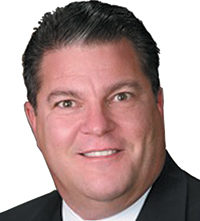No Sizzle, All Steak
Don’t judge an investment advisor’s competence and expertise based on appearance and academic degrees.

Let me set the scene for you. Three men were having lunch at a local restaurant, The Cabin Club. The restaurant is everything one would expect from a swanky prime steakhouse: overly attentive and professional wait staff, large portion sizes, great food and high prices. Two of the men were dressed to the nines, tailored suits, crisp-pressed shirts, cufflinks and silk ties. The other man wore khaki shorts, a t-shirt and a pair of boat shoes.
Can you guess who the waitress gave the bill at the end of the lunch?
No, not the well-dressed men. It was the guy dressed like a fellow from The Millionaire Next Door.
Come back with me to September 1987. I had started at a new firm, E.F. Hutton, and was in the manager’s office standing with my arms stretched out and being measured by a tailor for my custom-made shirt, suit and tie.
The manager shared his secret to success in the investment business: “Fake it until you make it.” That meant always being the best dressed in any situation, becoming a member of the local country club, and driving a luxury import or fancy sports car — even if you could not afford these things. The office theme was “Sell the sizzle, not the steak!”
In The Millionaire Next Door: The Surprising Secrets of America’s Wealthy, author Thomas J. Stanley calls it the “big hat, no cattle” syndrome. (Dr. Stanley wrote about me.) Sooner or later you have to produce. The image and all talk, no action vibe has a short shelf life.
With me, it was like pounding a square peg into a round hole. I just did not fit.
Now, don’t get me wrong. I occasionally wear a suit when I am a keynote speaker at a conference. But on most days, you will find me in a t-shirt or a golf shirt and a pair of jeans. My job is not to impress folks but to protect and grow their investment portfolio and retirement plan at work.
If that offends some and they decide to have someone else manage their money, I consider it a blessing. I partner with folks for the right reason — they buy into my investment philosophy, not because we are members of the same club.
Substance, Not Flash
This past February, Nassim Nicholas Taleb wrote an article, “Surgeons Should Not Look Like Surgeons,” that describes my circumstances more eloquently.
It is a chapter in his book, Skin in the Game. Here is an excerpt:
“Say you had the choice between two surgeons of similar rank in the same department in some hospital. The first is highly refined in appearance: he wears silver-rimmed glasses, has a thin build, delicate hands, measured speech and elegant gestures. His hair is silver and well combed. He is the person you would put in a movie if you needed to impersonate a surgeon. His office prominently boasts an Ivy League diploma, both for his undergraduate and medical schools.
“The second one looks like a butcher: he is overweight, with large hands, uncouth speech and an unkempt appearance. His shirt is dangling from the back. No known tailor in the East Coast of the U.S. is capable of making his shirt button at the neck. He speaks unapologetically with a strong New Yawk accent as if he wasn’t aware of it. He even has a gold tooth showing when he opens his mouth.
“The absence of a diploma on the wall hints at the lack of pride in his education; he perhaps went to some local college. In a movie, you would expect him to impersonate a retired bodyguard for a junior congressman or a third-generation cook in a New Jersey cafeteria.
“Now if I had to pick, I would overcome my suckerproneness and take the butcher any minute. Even more: I would seek the butcher as a third option if my choice was between two doctors who looked like doctors. Why? Simply because the one who doesn’t look the part, conditional of having made a (sort of) successful career in his profession, had to have much to overcome in terms of perception.
“And if we are lucky enough to have people who do not look the part, it is thanks to the presence of some skin in the game, the contact with reality that filters out incompetence, as reality is blind to looks.”
Have I ever been mistaken for a New York butcher? No, but I have been mistaken for being an FBI agent while visiting New York. Nonetheless, Taleb’s theme is valid.
I did not become successful as an investment advisor by being a flashy dresser or having family connections. I became successful by being myself and providing my clients with a logical, organized investment process.
What I have noticed in the past 30 years of being an investment advisor is that those who only sell the sizzle are compensating for something. My clients get the message. It’s not for everyone. What you see is what you get. No sizzle here — but I do enjoy a good steak.





